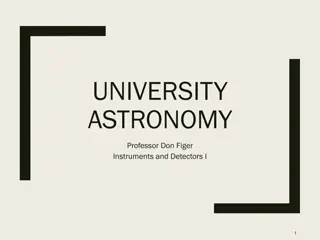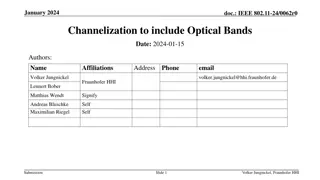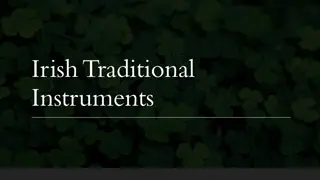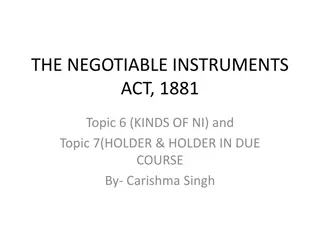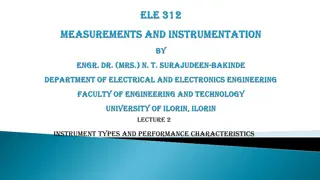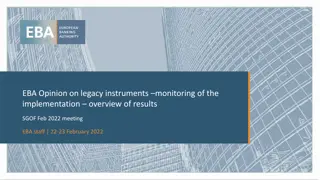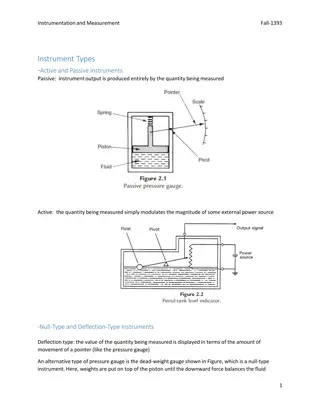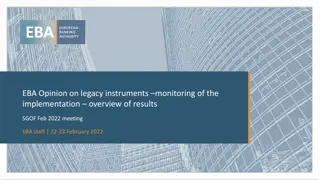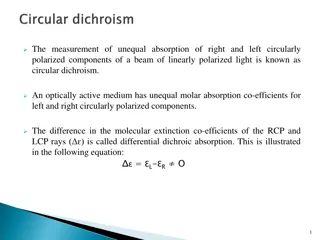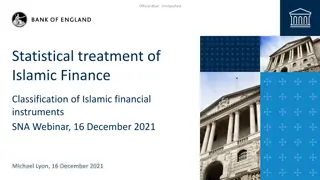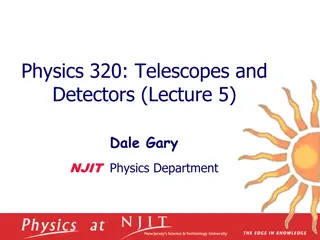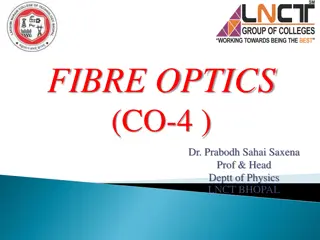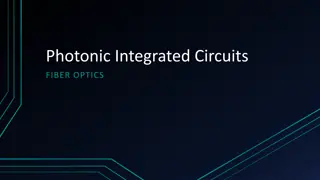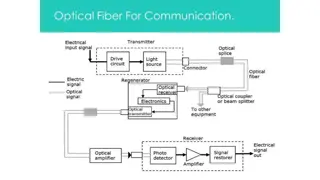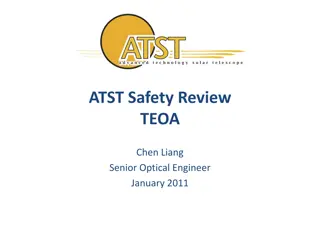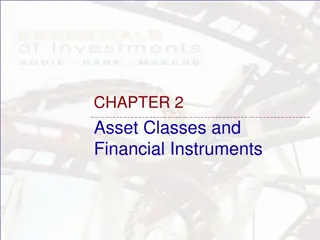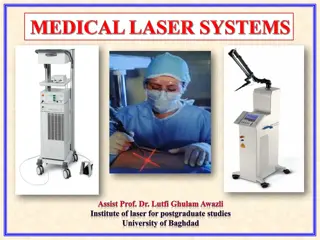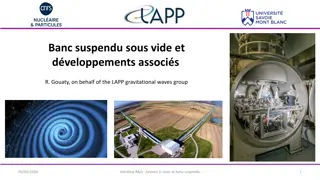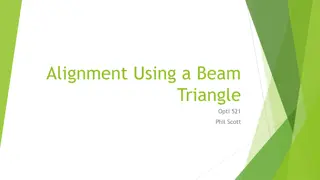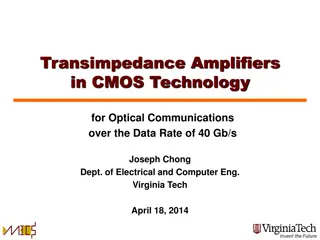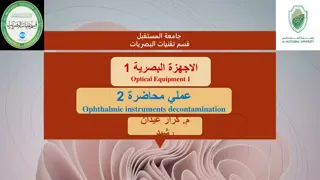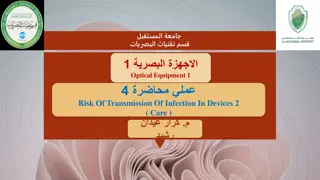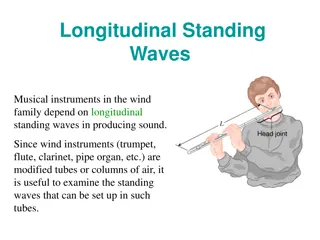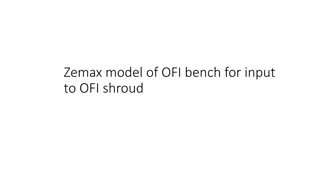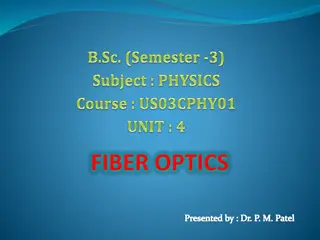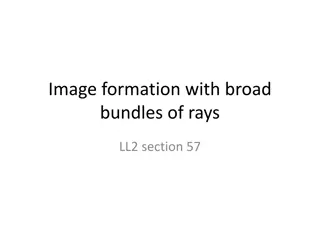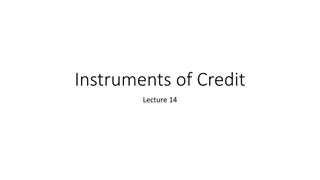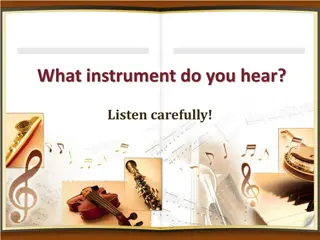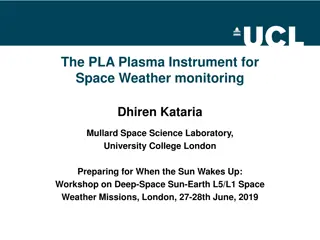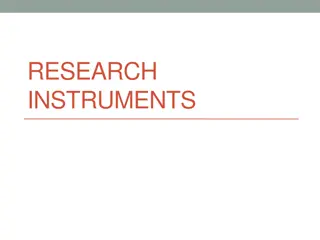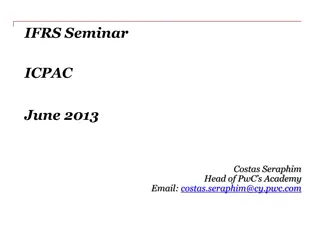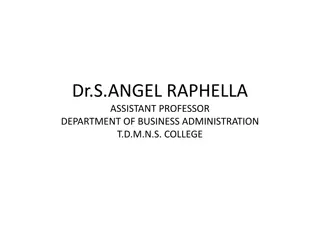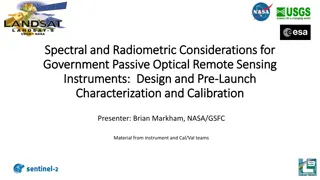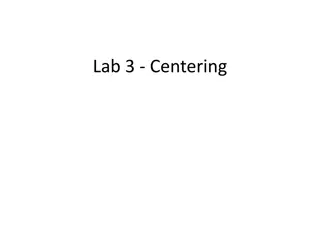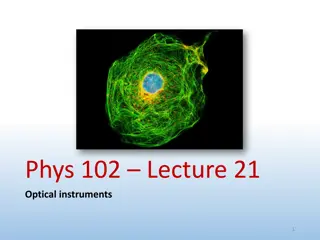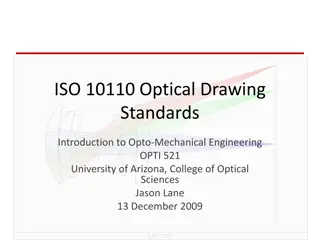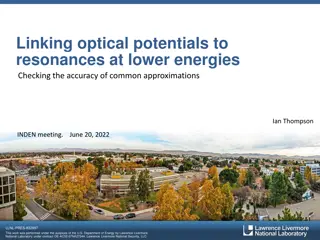Understanding Modern Optical and Infrared Astronomy Instruments
This presentation by Professor Don Figer explores modern optical and infrared instrumentation used in astronomy, including cameras, spectrographs, and specialized devices like coronagraphs. It covers instruments such as HST, Spitzer, Chandra, JWST, ELTs, and WFIRST, highlighting their capabilities i
0 views • 40 slides
Channelization to Include Optical Bands in IEEE 802.11 Standards
This document discusses the proposal to incorporate optical bands into the channelization framework of the IEEE 802.11 standard. It aims to align the channelization approach for integrated LC with that of mm-wave technology in the IMMW scope. The contribution highlights recent works, emphasizing the
2 views • 11 slides
Explore Irish Traditional Instruments and Music
Discover the diverse world of Irish traditional instruments such as the Flute, Fiddle, Tin Whistle, Low Whistle, Uilleann Pipes, Accordion, Concertina, Bodhrán, and Harp. Learn about the history and unique characteristics of these instruments, as well as the evolution of Irish music to include mode
0 views • 12 slides
Understanding the Negotiable Instruments Act, 1881: Types of Instruments and Holders
The Negotiable Instruments Act, 1881 was enacted to provide legal recognition to credit instruments easily transferable as money. It defines negotiable instruments like promissory notes, bills of exchange, and cheques, including local usages. Instruments can be negotiated multiple times until maturi
0 views • 25 slides
Understanding Instrument Types and Performance Characteristics
This content discusses different types of instruments, including active and passive, null-type and deflection-type, analog and digital, as well as smart and non-smart instruments. It delves into the static characteristics of instruments such as accuracy, precision, tolerance, linearity, and sensitiv
2 views • 39 slides
EBA Opinion on Legacy Instruments Monitoring Implementation Overview - Feb 2022 Meeting
The European Banking Authority (EBA) provided an opinion on legacy instruments monitoring at their Feb 2022 meeting. The presentation covers the monitoring in 2021, surveys, letters to competent authorities, and the overview of monitoring results. It discusses calls for input on the implementation o
0 views • 20 slides
Understanding Instruments in Instrumentation and Measurement
Passive and active instruments play key roles in measurement, with null-type and deflection-type instruments providing different ways to display values. Analogue and digital instruments offer varying outputs, while indicating instruments and those with signal outputs serve different purposes. Smart
2 views • 12 slides
Overview of EBA Opinion on Legacy Instruments Monitoring Implementation Results Feb 2022
In February 2022, the European Banking Authority (EBA) conducted monitoring on legacy instruments implementation. The presentation covers surveys, input from competent authorities, and outcomes. Efforts to address infection risks posed by legacy instruments were highlighted, with actions taken by in
2 views • 20 slides
Optical Properties of Optically Active Compounds
Circular dichroism and optical rotatory dispersion are important techniques for studying the optical properties of optically active compounds. Circular dichroism measures the differential absorption of left and right circularly polarized light components, while optical rotatory dispersion studies th
0 views • 17 slides
Statistical Treatment of Islamic Financial Instruments
Explore the classification and examples of Islamic financial instruments, such as Restricted Mudaraba and Waqf Funds. Understand the scope, process, and economic substance of these instruments, along with their classification in terms of financial assets and liabilities. Learn how to analyze and cla
0 views • 10 slides
Understanding Optical Telescope Types and Lens-Maker's Formula
Optical telescopes utilize lenses or mirrors to collect and focus light for imaging celestial objects. The lens-maker's formula is crucial for determining the focal length of lenses, considering factors like index of refraction and radii of curvature. Different lens configurations and materials help
0 views • 17 slides
Overview of Optical Fibre Technology and Applications
Optical fibre technology, spearheaded by Dr. Prabodh Sahai Saxena, revolutionizes communication systems through light transmission. This cutting-edge technology utilizes fibre optics made of glass or plastic to carry light signals, offering advantages like high bandwidth, low signal loss, and no ele
0 views • 20 slides
Evolution of Optical Technology: From Telegraph to Photonic Integrated Circuits
The journey of optical technology evolution spans from the invention of the telegraph in 1836, through the introduction of optical fibers in 1978, to the development of photonic integrated circuits in the present era. Key milestones include the advent of optical amplifiers in 1990, the emergence of
0 views • 70 slides
Fiber Optic Communication System Overview
This article presents a detailed explanation of a point-to-point fiber optic communication system, outlining the process from voice conversion to signal transmission and reception. It discusses the advantages and limitations of optical communication systems, along with numerical examples related to
5 views • 11 slides
Optical Equipment Safety Review and Hazard Analysis
This document provides an in-depth review of the safety considerations for the ATST optical equipment, focusing on potential hazards associated with the M2 Mirror, Heat Stop Assembly, and other critical components. The Preliminary Hazard Analysis identifies various risks, causes, and recommended act
0 views • 13 slides
Understanding Financial Instruments and Markets
Explore asset classes like fixed income securities, money market instruments, and capital market instruments. Learn about different financial instruments in various markets including money market, bond market, equity markets, and derivative markets. Dive into money market instruments like Treasury b
0 views • 47 slides
Overview of Laser Delivery Systems for Surgical Procedures
Institute of Laser for Postgraduate Studies at the University of Baghdad, led by Assist. Prof. Dr. Lutfi Ghulam Awazli, focuses on laser delivery systems in surgical procedures. The systems discussed include optical fibers, articulated arms, hollow waveguides, and free beams. Optical fibers, compose
0 views • 10 slides
Understanding Optical Storage Technology
Optical storage technology originally designed for audio offers a capacity of 650MB, providing over 70 minutes of audio playback. Data is recorded digitally on a polycarbonate disk's surface as microscopic pits. The disk is organized in a spiral track with sectors of the same length arranged in bloc
5 views • 16 slides
Advances in Optical Bench Technology for Gravitational Wave Detectors
This content discusses the latest advancements in optical bench technology for gravitational wave detectors, focusing on precise measurements of back-scattered light, development of new optical cavities, and testing of Sagnac interferometers. Key objectives include improving suspension controls, red
0 views • 13 slides
Optical Alignment Using Beam Triangle Opti 521 Phil Scott
This presentation delves into the intricate process of optical alignment using a beam triangle, focusing on defining optical and mechanical axes, addressing alignment challenges, degrees of freedom for various elements, and the importance of setting up a beam triangle for accurate alignment. The con
0 views • 14 slides
Transimpedance Amplifiers in CMOS Technology for Optical Communications at 40 Gb/s
This research by Joseph Chong at Virginia Tech delves into the use of transimpedance amplifiers (TIAs) in CMOS technology for optical communications operating at a data rate of 40 Gb/s. The study outlines the motivation behind the project, the role of TIAs in optical receivers, TIA circuit topologie
0 views • 52 slides
Ophthalmic Instruments Decontamination Guide
Decontamination of optical equipment and ophthalmic instruments is crucial to ensure their safe reuse, preventing healthcare-acquired infections. This guide covers steps like cleaning, disinfection, and sterilization using various methods such as chemical and physical processes. Proper care and hand
0 views • 15 slides
Analyzing Opposition to Musical Instruments in Worship
The opposition to using musical instruments in worship is based on beliefs stemming from biblical references that emphasize singing, the lack of explicit authorization for instruments in the Bible, and arguments regarding the essence of worship as prescribed by God. Various scriptures and interpreta
0 views • 19 slides
Proper Care and Maintenance of Optical Equipment to Prevent Infections
Regular examination and proper cleaning of tonometer prisms are essential to reduce the risk of transmitting infections during eye examinations. Disinfection and sterilization processes are crucial in maintaining optical equipment hygiene. Different disinfectants and physical methods can be used to
0 views • 24 slides
Understanding Longitudinal Standing Waves in Musical Instruments and the Human Ear Canal
Musical instruments in the wind family rely on longitudinal standing waves to produce sound, with wind instruments like trumpet, flute, clarinet, and pipe organ being modified tubes of air. This article explores the concept of standing waves in open tubes of air and their relevance to instruments an
0 views • 4 slides
Optical Frequency Interferometer Bench Analysis
Detailed examination of the optical setup for an Optical Frequency Interferometer (OFI) system, including the input/output configurations with various optical components such as prisms, crystals, and wave plates. The analysis focuses on the path and behavior of beams within the system, considering r
0 views • 14 slides
Evolution of Optical Fiber Technology
Optical fiber technology has a rich history starting from John Tyndall's demonstrations in 1870 to the development of flexible fiberscopes by Hopkins and Kapany. This technology revolutionized communication systems and medical diagnostics, enabling the transmission of information through thin glass
0 views • 85 slides
Optical Image Formation: Principles and Conditions
Understanding the principles and conditions governing optical image formation, including the role of broad bundles of rays, wave surfaces, magnification ratios, and axially-symmetric optical systems. Explore the conditions for imaging line segments, optical path lengths, and the general criteria for
0 views • 13 slides
Understanding Credit Instruments and Negotiable Instruments
Credit instruments play a crucial role in modern business by facilitating the transfer of money between lenders and borrowers. These instruments, such as Payroll Credit, Book Credit, and Documentary Credit, come in various forms like oral agreements and written documents. Negotiable instruments, on
0 views • 11 slides
Understanding Timbre in Musical Instruments
Explore the concept of timbre in musical instruments, including how different instruments produce unique sounds through vibration. Learn about woodwind, brass, and string families, and use descriptive words to describe timbre qualities. Enhance your knowledge of how instruments such as clarinet, obo
0 views • 12 slides
Advancements in Plasma Instruments for Space Weather Monitoring
Explore the latest developments in plasma instruments for space weather monitoring, including the PLA Plasma Instrument and MSSL Heritage in Plasma Instruments. These instruments enable precise measurement of plasma parameters in deep space, supporting missions to study solar wind, ion densities, an
0 views • 22 slides
Understanding Research Instruments in Academic Studies
Research instruments play a crucial role in academic research by helping researchers collect data effectively. These instruments need to be valid, reliable, and usable to ensure accurate results. Different types of research instruments exist, including questionnaires, interviews, and checklists. Val
0 views • 25 slides
Understanding Financial Instruments in IFRS: Key Concepts and Overview
This content provides an overview of financial instruments under IFRS, focusing on their classification as assets, liabilities, or equity. It explains the presentation of compound financial instruments and outlines key concepts related to financial assets, financial liabilities, and equity instrumen
0 views • 28 slides
Driving Economic Recovery with Recapitalisation Instruments for Smaller EU Corporates
Amid the aftermath of the Covid-19 pandemic, the need for recapitalisation instruments for smaller EU corporates has become apparent. These instruments, such as equity and hybrid options, can provide essential fresh capital for companies to invest in innovation and drive economic growth. AFME's expl
0 views • 12 slides
Understanding Negotiable Instruments: Law and Characteristics
The Negotiable Instruments Act of 1881 governs the law related to negotiable instruments in India. These instruments are transferable written documents entitling the holder to a certain sum of money. Characteristics include free transferability, title free from defects, transferee's right to sue, an
0 views • 34 slides
Spectral and Radiometric Considerations for Government Remote Sensing Instruments
This presentation explores the important considerations in designing and calibrating government passive optical remote sensing instruments, focusing on spectral and radiometric aspects. Topics include spectral variation, design considerations, uniformity, reflectance calibration, and examples from i
0 views • 27 slides
Lab 3: Centering Optical Elements & Systems with Precision
Centering optical elements and systems accurately is crucial for optical alignment processes. This lab focuses on using an air bearing rotary table and dial indicators to achieve precise centering. The equipment used includes PSM, displacement indicators, adjustment screws, and magnetic mounts. Prop
0 views • 14 slides
Understanding Optical Instruments: Lenses, Images, and Magnification
Discover how combinations of lenses form images, explore thin lens equations and magnification principles, learn about compound microscopes, and understand the limits to resolution including spherical and chromatic aberrations and dispersion effects in this informative lecture on optical instruments
0 views • 21 slides
Understanding ISO 10110 Optical Drawing Standards
ISO 10110 Optical Drawing Standards provide guidelines for preparing drawings of optical elements and systems, essential for interpreting optical drawings accurately. The standard includes 13 parts covering aspects such as material imperfections, surface form tolerances, and more. Compliance with IS
0 views • 17 slides
Exploring Optical Potentials and Resonances at Lower Energies
Investigating the accuracy of common approximations in linking optical potentials to resonances at lower energies. The study focuses on neutron reactions with 14N as a test case, transitioning from R-matrix theory to Hauser-Feshbach models and evaluating known levels and level densities. Key topics
0 views • 22 slides
